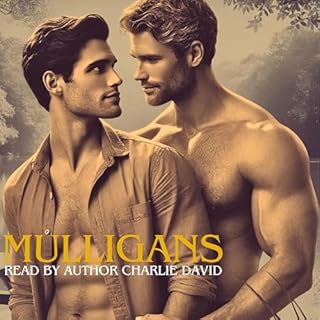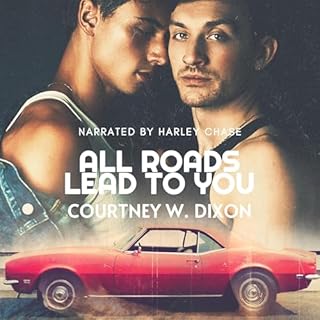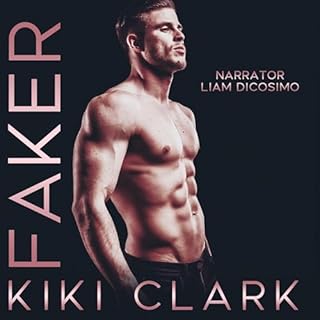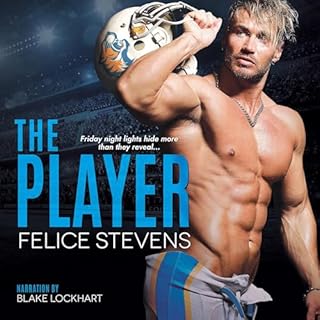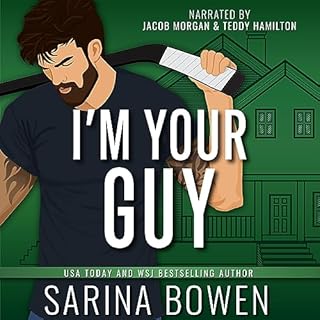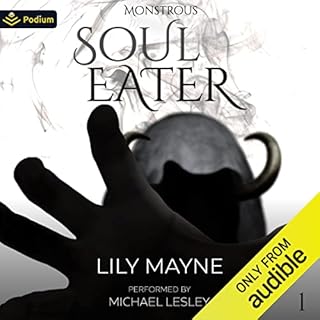Zell Oakley
- 140
- reviews
- 481
- helpful votes
- 280
- ratings
-
Mulligans
- By: Charlie David
- Narrated by: Charlie David
- Length: 4 hrs and 38 mins
- Unabridged
-
Overall3 out of 5 stars 2
-
Performance3 out of 5 stars 2
-
Story3 out of 5 stars 2
Chase never had many friends, but at college, he meets and forms close ties with straight jock Tyler Davidson—a connection he fears he’ll lose if he tells Tyler he’s gay. Keeping his sexuality secret becomes harder for Chase as he joins Tyler and his family at their idyllic lake house for the summer. It grows more and more difficult for Chase to avoid Tyler’s attempts to set him up with girls, and he’s tired of making excuses. Chase is ready to embrace the man he is, but he’s afraid of what it will cost him.
-
1 out of 5 stars
-
The worst audiobook I've ever listened to
- By Zell Oakley on 12-09-24
- Mulligans
- By: Charlie David
- Narrated by: Charlie David
The worst audiobook I've ever listened to
Reviewed: 12-09-24
Pretentious, depressing, awful. Not a single character is uplifted or happier at the end of the book and I am worse for having read it. Don't be fooled by the cover or the blurb, this is an anti-romance novel. Poorly-written, poorly-read with no dynamic range or distinction between characters. Characters are flat, especially Chase, who I never got any real sense of at all. Awful, awful, awful. Awful.
Something went wrong. Please try again in a few minutes.
You voted on this review!
You reported this review!
-
All Roads Lead to You
- A 1980s Stepbrother Road Trip Romance
- By: Courtney W. Dixon
- Narrated by: Harley Chase
- Length: 9 hrs and 8 mins
- Unabridged
-
Overall5 out of 5 stars 33
-
Performance5 out of 5 stars 32
-
Story5 out of 5 stars 32
Nicholas Theodoropoulos had been my stepbrother since I was fourteen. Mom died when I was twelve, and I resented Dad remarrying so soon. Even worse, my stepbrother had grown into a gorgeous man. I hated looking at him, reminding me every day of what I could never have. No one knew I was gay and never would. But when my best friend backed out of our road trip to California, Dad forced me to travel with my stepbrother. It was the only way if I wanted to go on this journey I’d been planning since middle school. Nothing good would come out of this.
-
5 out of 5 stars
-
Great Book!
- By Brittany A on 01-03-25
- All Roads Lead to You
- A 1980s Stepbrother Road Trip Romance
- By: Courtney W. Dixon
- Narrated by: Harley Chase
Anachronisms
Reviewed: 11-15-24
The book was ok until I got a lecture from the author (via a peripheral gay character) about pansexuality that sounds like it came straight out of a 2024 college campus. Decently written book, too many modern day phrases and anachronisms for me. Just because you looked at the wikipedia page for "1980s in music" doesn't mean you're being authentic. It's going in my "delete from my library" pile.
Look, authors, it's ok to just have a straight character be in a relationship with a guy and not ruminate on it. Nobody is looking for realism in gay-for-you (or "bisexual awakening") books. I don't need a treatise from a straight female author about male sexuality that you're just gonna get wrong, especially from a book that takes place in the late 1980s before every straight person and their mother decided to claim partial ownership of the "queer community."
Something went wrong. Please try again in a few minutes.
You voted on this review!
You reported this review!
-
Faker
- Forever Family Trilogy, Book 3
- By: Kiki Clark
- Narrated by: Liam DiCosimo
- Length: 2 hrs and 45 mins
- Unabridged
-
Overall4.5 out of 5 stars 14
-
Performance4.5 out of 5 stars 13
-
Story4.5 out of 5 stars 13
All Samuel wanted was to not show up to his ex's wedding alone, but his friend Will has a better idea: go as fake boyfriends to make him jealous. What could possibly go wrong? Well, for starters, Samuel’s ex knows Will isn’t gay. Of course, Will has a solution for that too. They’ll just have to convince him. By whatever means necessary. As the big day approaches—and he and Will keep practicing how to pull off their charade—Samuel’s not sure he’ll make it through the wedding festivities without losing some of his dignity.
-
3 out of 5 stars
-
Competently written
- By Zell Oakley on 07-27-24
- Faker
- Forever Family Trilogy, Book 3
- By: Kiki Clark
- Narrated by: Liam DiCosimo
Competently written
Reviewed: 07-27-24
I’m not going to complain that this book, like all modern romance novels, is nothing but a collection of tropes. Friends to lovers, bi-awakening, fake boyfriends, it’s like someone picked a bunch of candy hearts out of a jar and those were the words written on them. I’m also not going to complain that every so often the action stops dead so the author can lecture us on the Issue of the Day™ such as informed consent or whatever. Because again, that’s every romance novel written after 2020.
Ok in reality I’m going to complain a little about both those things because I already did. But I’m not going to complain MUCH about them. What I am going to mention is that the m/m romance genre suffers greatly, and this book has a PARTICULARLY bad case of it, from being written both by and for women, and as a result can be described as anywhere from unrealistic to borderline homophobic.
Samuel, in this book, basically IS a woman. You could replace him with a female character and, with surprisingly few edits such as removing Will questioning his sexuality, you’d have the same book. In fact, in all the gay relationships in the book, and I’m assuming these are from the other books in the series, there seems to be one “man” archetype and one “woman” archetype, and I just have to wonder, does this author actually know any male couples? Because our relationships don’t actually work like that, and I thought we’d left the question “so which one of you is the ‘woman’” somewhere in the past.
What’s worse, it seems like in every relationship in this book, the gay character is the “woman” and the bisexual character is the “man.” This is also something completely divorced from reality, and quite honestly pretty insulting. Actually I’m not sure where female authors got the idea that most male couples must consist of one gay man and one bisexual, because that’s not really all that common a situation in reality.
But whatever, I guess that’s what you get when you read “bi-awakening” novels, which used to be called “gay for you” and were perfectly fine pieces of romance novel fluff until someone somewhere got the idea that they needed to legitimize them somehow and now every one of them has a scene where the straight guy has to ruminate on how fluid sexuality actually is, eyeroll.
Anyway sorry, I’m becoming super jaded as a gay man reading gay fiction written for women, so who knows, maybe most people who buy this WANT a very obvious female self-insert and they’ll actually love this book. It’s certainly perfectly competently written and the actual plot is well-crafted even if it is just tropes. So go for it, if that’s what you’re into. But please keep in mind that in real life, gay men are actually also men, and we don’t typically sit around depending on our bisexual partners to protect us from the big bad world and tell us that it isn’t ok that our ex was sexually pushy. I don’t even OWN a fainting couch, believe it or not.
Liam DiCosimo is a good narrator even though his “older man” voices are a bit awkward. I don’t know, this book isn’t any worse than most m/m romance novels, really, I’m just getting so sick of the whole thing.
Something went wrong. Please try again in a few minutes.
You voted on this review!
You reported this review!
2 people found this helpful
-
Hunt the Wood
- Beautiful Nightmares, Book 1
- By: Amy Pennza, Anna Fury
- Narrated by: Tor Thom, Kirt Graves
- Length: 5 hrs and 58 mins
- Unabridged
-
Overall4.5 out of 5 stars 53
-
Performance5 out of 5 stars 49
-
Story4.5 out of 5 stars 49
When my grandmother, the leader of the Rathmore Coven, summons me, I have no choice but to answer her call. To reach her, I must cross the Wood, the realm of Wotan, lord of the hunt. Rumors of his cruelty and brutality precede him, but nothing prepares me to meet the monster face to face. Because Wotan is more than a monster. He's a predator, a bully, and now he's claimed me as his pawn in his war against my grandmother. A master of torture, he's determined to master me, stripping me bare of all my secrets.
-
5 out of 5 stars
-
"Big Bad Wolf" X His little witch!
- By Rose~Dove on 01-31-24
- Hunt the Wood
- Beautiful Nightmares, Book 1
- By: Amy Pennza, Anna Fury
- Narrated by: Tor Thom, Kirt Graves
Morally a mess
Reviewed: 04-25-24
Hunt the Wood is a story that, in essence, boils down to a supernatural mob boss who rapes an innocent man, catches feelings, then they live happily ever after together. Ok.
All right, i admit that’s a little simplistic, and maybe not entirely fair since the blurb is pretty up front about the kind of person Wotan is, so, buyer beware, right? I’ve read and enjoyed dark romance about morally repugnant characters. My problem with the morality of the book and the world the two authors have created lies more in the hypocrisy. Because they try to have it both ways: they want Wotan to be a murderous rapist but they also want him to be a teddy bear that we root for.
They fall back on the same tired trope that Lily Mayne does in her (suspiciously similar) monster series: we’re so used to humanity being portrayed as evil or selfish that it’s just taken as a given. So it doesn’t matter that the monsters are all pretty savage, we’re supposed to believe that the human resistance to their hostile takeover of our world is a bad thing. At least in Mayne’s worldbuilding, the monsters are genuinely frightful and alien; the monsters in this world are basically no different from humans, but with special powers. This is—to put it in a way modern pink-haired outrage jockeys can understand—colonization, but in this case we’re meant to sympathize with the colonizers because humans = bad.
Anyway there’s an overuse of the word “male,” a marshmallow-centered rapist and the whole thing is just a mess. And there’s nothing wrong with telling a morally gray story but don’t tell me it’s not really morally gray at all because everyone gets what they deserve. And don’t tell me it’s ok because Ryder enjoyed himself; Wotan has a dungeon specifically for sex torture and surely Ryder isn’t its first occupant. You can’t have your cake and eat it too.
Something went wrong. Please try again in a few minutes.
You voted on this review!
You reported this review!
-
Alpha's Awakening
- Tales of the Tellurian Pack, Book 1
- By: Blake R. Wolfe
- Narrated by: David Lane
- Length: 7 hrs and 22 mins
- Unabridged
-
Overall4 out of 5 stars 32
-
Performance4.5 out of 5 stars 29
-
Story4 out of 5 stars 29
After losing his father and finding out his boyfriend had been cheating on him for months, Kael runs away from home, determined never to step foot back in that part of the world again.
-
5 out of 5 stars
-
Sexy Escape
- By The Black Unicorn of Darkness on 11-19-24
- Alpha's Awakening
- Tales of the Tellurian Pack, Book 1
- By: Blake R. Wolfe
- Narrated by: David Lane
Am I supposed to like this main character?
Reviewed: 04-24-24
It's never a good thing when the protagonist of a romance novel rubs you the wrong way right off the bat, but holy hell does Kael annoy the crap out of me in the beginning of this book, starting with being snarky and obnoxious to low wage customer service employees. Shortly after arriving in town, he meets Chance, his fated mate or true love or whatever we're calling it in this universe, and is incredibly rude to him almost from the get go for no reason. Now there's nothing wrong with a protagonist being a jerk, or at least starting out that way, but I honestly don't think the author realizes what a jerk he is, or if we're supposed to think he's righteously angry at Chance somehow. Chance makes one offhand comment that Kael doesn't like and you'd think Kael caught him kicking puppies for fun. Soon accusations of "mansplaining" are being thrown around and, look, "mansplaining" is a dumb and sexist accusation under the best of circumstances, but even leaving that aside, it certainly doesn't apply here, where (1) both people involved are men, and (2) Chance was directly responding to a question that Kael had asked. He continues being irritating and rude and if Chance were smart, he'd run in the opposite direction, fate be damned.
I'd like to think Kael gets over himself at some point but why on earth would I want to continue listening to a book from the perspective of a spoiled, whiny, entitled snarky creep?
Narration is perfectly competent. I'd be happy to buy another audiobook he is involved with, which is more than I can say for this author.
Something went wrong. Please try again in a few minutes.
You voted on this review!
You reported this review!
-
The Player
- By: Felice Stevens
- Narrated by: Blake Lockheart
- Length: 10 hrs and 20 mins
- Unabridged
-
Overall4.5 out of 5 stars 74
-
Performance4.5 out of 5 stars 70
-
Story4.5 out of 5 stars 70
High school librarian Niall Harper has always done the right thing. Except be true to himself. Divorced and raising his teenaged son, Niall is dismayed to discover the new football coach is none other than his long-ago Friday night fantasy and nemesis. Not that it matters—Keller doesn’t remember him. It’s nothing new; Niall has always been easy to forget. Now Keller wants to be friends. And more. Niall can’t deny the annoying man makes him laugh and feel things he’d only dreamed possible. But would a player like Keller be satisfied with a regular guy like him?
-
5 out of 5 stars
-
concern for the players
- By Anonymous User on 01-05-25
- The Player
- By: Felice Stevens
- Narrated by: Blake Lockheart
Trope-laden garbage
Reviewed: 04-13-24
I almost feel bad that romance authors are so beholden to the tropes that romance readers crave that original stories are hard to come by. But there’s a way to do tropes right and a way to do them wrong, and this trope, which is enemies-to-lovers, is done wrong. Primarily, this is because Niall, the bookish nerd, begins the book being a complete jerk to Keller, our jock, and I was never really able to move past that.
Look, as someone who was mildly bullied in high school but is now roughly the same age as the characters in this book, I sort of get where Niall is coming from, but on a more realistic note, get over it already, dude. It happened twenty years ago when you were a kid. I can’t imagine still holding a grudge against people who I had an issue with in high school, holy cow.
The author tries to have her cake and eat it too, here. She wants us to like Keller, so HE didn’t bully Niall, nor was he even aware it was happening. And Niall knows this. But you can’t have it both ways; if Keller wasn’t involved, he wasn’t involved and Niall has no right to treat him like crap. But no, he berates Keller, makes him feel guilty for something he didn’t do, and Keller has to grovel to him because that’s how the trope goes and everyone’s head would explode if the plot weren’t mapped out for them before they even began the book.
This is also (sort of) a sports romance. There are two types of people who write sports romances: those who enjoy sports and those who think sports and the people who play them are worthless and should be dumped on at every opportunity. Personally, my experience in and after high school is that jocks were no better or worse than any other group, bullying-wise, and I suspect that everyone who automatically thinks jocks = bullies watches too many movies set in high school. This author seems very taken with the idea that jocks are jerks and “sports” is just something that other people enjoy, people who she doesn’t associate with.
Something went wrong. Please try again in a few minutes.
You voted on this review!
You reported this review!
-
Shiver
- For Puck's Sake, Book 1
- By: Crea Reitan
- Narrated by: Shawn K. Jain, Simon Dornet
- Length: 9 hrs and 11 mins
- Unabridged
-
Overall4.5 out of 5 stars 213
-
Performance4.5 out of 5 stars 206
-
Story4.5 out of 5 stars 206
Egon Wolf is on a hockey scholarship but failing at everything else. Knowing he's going to lose his ride if he doesn't get his academic act together, he seeks out a tutor. Rakesh Aahnu is a dual major and dangerous when bored. What he enjoys more than anything is the challenge of making straight men fall for him before walking away. Just because he can. Both Egon and Rakesh are about to discover that life has a way of throwing you in the sin bin when you least expect it.
-
5 out of 5 stars
-
Sweet and hot
- By Zell Oakley on 12-11-23
- Shiver
- For Puck's Sake, Book 1
- By: Crea Reitan
- Narrated by: Shawn K. Jain, Simon Dornet
Sweet and hot
Reviewed: 12-11-23
A relationship develops between sweet, straight (or so he thought) hockey player Egon and brilliant, gay, cocky grad student Rakesh after Rakesh agrees to tutor Egon to save Egon's scholarship. There are ups and downs, their relationship borders on co-dependent (and may cross the border at some points) but I got such a sweet feeling from it. Overall this was a wonderful book! It's easily a contender for my favorite romance audiobook of the year.
Rakesh is dominant and Egon is submissive, but despite that, this isn't one of those books where you feel as though the characters aren't equals. The sex is hot, and coming from me that's a huge compliment since I normally skip past the sex scenes (weird from someone who reads this type of book, I know). Both characters grow through the novel, but, ironically, Egon, whose sexuality changes (or at least his perception of it does), doesn't grow as much as Rakesh, who comes across as arrogant for the first half of the novel and could stand to be taken down a few pegs. Don't let his attitude in the beginning put you off.
If I had to list any complaints, I'd say the book goes on a little too long. Not that it ever gets boring, per se, I just mean it could have ended a couple hours before it did and still have told a complete story. However, I enjoyed the writing and narration so much that I'm glad it didn't! Also, Egon is a hockey player and the name of the series alludes to hockey, but don't expect very much hockey at all, as Egon is pretty clear from the beginning he has no interest in a professional hockey career. I'm not sure who the characters will be in the subsequent novels in the series, if they're taken from this book at all, since although there were definitely other hockey players in the book, they all sort of blended together a bit for me.
I'm gay, so I'm always curious about the politics of sexuality in m/m romance novels, especially ones written by women who, no offense, are on the outside looking in when it comes to male sexuality. So is Egon bisexual? Gay? Something else? I don't know because the book never really defines it clearly and that's a good thing. Too many gay-for-you novels try to pin down the "straight" character's sexuality and that's a huge mistake in my opinion. Rakesh has one episode where he goes on about how fluid sexuality is, but he's also 100% gay himself and admits that he's being hypocritical, which saved me from docking a star from my review--my sexuality isn't fluid and I always sort of resent when someone tells me that it should be.
The narrators were both flawless. I was not familiar with either of them, but they were easily the match of any bigger name narrators in the m/m genre. Simon Dornet sounds like a cross between Kale Williams and Greg Boudreaux/Tremblay, if that means anything to anyone. I will put this book in my short list of books that I want to listen to over and over again.
Something went wrong. Please try again in a few minutes.
You voted on this review!
You reported this review!
3 people found this helpful
-
Breaking the Stallion
- Hell Bent for Leather, Book 1
- By: Rain Carrington
- Narrated by: J. Sampson
- Length: 11 hrs and 25 mins
- Unabridged
-
Overall4.5 out of 5 stars 7
-
Performance4.5 out of 5 stars 5
-
Story4 out of 5 stars 5
With a less than fulfilling relationship in his rearview mirrors and a 50,000 dollar watch in his pocket, Elijah James heads out on the open road, in search of something real. And in search of himself.
-
2 out of 5 stars
-
Toothless
- By Zell Oakley on 10-15-23
- Breaking the Stallion
- Hell Bent for Leather, Book 1
- By: Rain Carrington
- Narrated by: J. Sampson
Toothless
Reviewed: 10-15-23
This book accomplishes something I thought was impossible: taking rather hardcore BDSM practices and somehow making them toothless, saccharine, and frankly boring. I feel like this author should have written a textbook about BDSM instead of a novel, because she sure spends a lot of time on making sure we know how it's supposed to work. 90% of the characters' time is spent negotiating their kinks or aftercare. Every once in a while the dom (I've forgotten his name already and I just finished listening today, that's how bored I was) remembers he's supposed to do something sort of nasty, and he does it, but almost always it's punctuated by constantly asking for consent--despite the fact that it's already been given and the sub knows the safe word--and making sure the sub (again, no idea what his name is) is ok and comfortable, which... how does that not take the sub out of the scene a bit? At one point he actually makes the sub say the safe word just to make sure he knows what it is. So much time is spent discussing what they're ok with and what they're not ok with and how things are supposed to work that they don't actually get into doing anything until literally FIVE HOURS IN, which is longer than a long novella, and even when they finally get to the kink, they do like one thing and go straight back to the negotiations and discussions.
Who is this written for? The author obviously has talent, because there's some genuinely good character development and writing, and what little actual sex there is is hot (minus the incessant cuddling and asking for consent), but I can't figure out if this book would appeal more to people who like the cuddling or to people who like the kink. For what it's worth, I'm pretty sure it's neither, since I think both have their place and the weird juxtaposition of trying to have both in the same scenes just sort of squicked me out. This novel is what comes from trying to pander to a demographic who likes to think of themselves as sex-positive but in reality are mostly massive prudes.
Like I said, I do think it was well written and I would be curious to read or listen to another work by this author. However, I don't want to be lectured to about proper BDSM practices for 12 hours again, because I've already heard it. In fact, I'm pretty sure just by finishing this book I'm actually a qualified sex therapist now.
Something went wrong. Please try again in a few minutes.
You voted on this review!
You reported this review!
1 person found this helpful
-
I'm Your Guy
- Hockey Guys, Book 2
- By: Sarina Bowen
- Narrated by: Teddy Hamilton, Jacob Morgan
- Length: 9 hrs and 55 mins
- Unabridged
-
Overall5 out of 5 stars 715
-
Performance5 out of 5 stars 671
-
Story4.5 out of 5 stars 671
The furniture district is my personal hell. I don’t know my ass from an ottoman. But when a hot designer comes to my rescue, I realize my problems are bigger than the house I’m trying to furnish.
-
4 out of 5 stars
-
Good with some reservations
- By Zell Oakley on 10-11-23
- I'm Your Guy
- Hockey Guys, Book 2
- By: Sarina Bowen
- Narrated by: Teddy Hamilton, Jacob Morgan
Good with some reservations
Reviewed: 10-11-23
Sarina Bowen is easily one of the best "mainstream" M/M romance authors. She focuses much more on telling a good story than, say, Lauren Blakely, whose writing always seems to me more like a collection of tropes thrown together in order to make a certain demographic swoon, at the expense of plot and character development. I was first introduced to Bowen through "Him" and "Us" (and "Epic," I suppose), which features the same narrators as "I'm Your Guy," Jacob Morgan and Teddy Hamilton. "I'm Your Guy" is typical high quality Sarina Bowen writing, but I did have a few issues with it.
We're introduced to Carter, an openly gay interior decorator, and Tommaso, a closeted NHL player. As a gay male reader of a genre written almost exclusively by straight women, I appreciate stories about actually closeted men as opposed to previously straight men who suddenly realize they're bisexual, which is exceedingly rare in reality, although I've already expressed my admiration for "Him" and "Us" which features this trope so who am I to complain? Still, Bowen's "The Understatement of the Year," featuring a closeted character, is much better than "Him" (and they're both better than this novel, incidentally). Bowen generally gets most things right about gay men, her propensity for having them refer to themselves as "queer" notwithstanding, since I've never heard any gay man over the age of 20 who isn't an activist or journalist use that word, and a lot of us hate it.
I liked Carter and Tommaso, flawed though they both were. I think I was supposed to like Carter more than Tommaso, since he's out and proud, but I didn't. Most gay men are generally understanding of guys who are closeted, so I'm not sure it was entirely fair of Carter to skip out the moment he realized that Tommaso wasn't going to be parading him around as his boyfriend, especially because he already knew that going in. I liked most of the ancillary characters with the exception of Carter's friend Rigo(?), possibly because he's the worst offender with the "queer" thing, and possibly because he's a bit two dimensional as a character (he's "a queer sports fan" and that's all we really need to know about him) and takes up too much space in the book that could have been devoted to other, more interesting characters like Tommaso's mother, ex-wife, sister, and teammates, or Carter's ex-boyfriend, who is portrayed as a villain but in the one scene he appears actually seems pretty astute in his cutting assessment of Carter.
There was one instance of male body shaming that was pretty jarring, when a character stated that people who write mean comments online are doing so because they are all compensating for having "small penises." It stuck out, in a book which otherwise hammers home the point about not using slurs or saying derogatory things about people, to also say that an entire demographic (men who aren't well endowed) is apparently worthy of scorn for something they have no control over. And if you think it isn't saying that, that it's just trying to insult people who write nasty comments, I'd ask you why it's just taken as a given that having a small endowment is something that needs to be compensated for, or why this (frankly overused) insult is supposed to be so humiliating for the mean commenters. I get that in romance novels, a man's worth can be judged by the size and shape of his manhood (Tommaso's is more than once described as "perfect" so you just know he's a great guy), but imagine a modern novel which glibly said that a group of women the author doesn't like are probably just compensating for being overweight, or having small busts. I realize that it's just a throwaway remark, but it runs so hypocritically counter to the message of the rest of the novel that it knocked my story review down from four stars to three.
Something went wrong. Please try again in a few minutes.
You voted on this review!
You reported this review!
13 people found this helpful
-
Soul Eater
- Monstrous, Book 1
- By: Lily Mayne
- Narrated by: Michael Lesley
- Length: 12 hrs and 30 mins
- Unabridged
-
Overall4.5 out of 5 stars 609
-
Performance4.5 out of 5 stars 534
-
Story4.5 out of 5 stars 533
Twenty years ago, monsters rose on earth and began a new age of civilization. One where humans live in military-controlled, cramped and dirty cities along the coasts, and the majority of the United States is known as the Wastes. A lawless, desolate and dangerous place, teeming with monsters that have claimed the land for their own. Including Wyn the Soul Eater. He appears every three years, making his way across the country and slaughtering humans randomly, sucking them dry until they’re nothing but husks.
-
3 out of 5 stars
-
I wanted to like this....
- By Kristine on 03-07-23
- Soul Eater
- Monstrous, Book 1
- By: Lily Mayne
- Narrated by: Michael Lesley
Weird morality
Reviewed: 07-07-23
I wanted so badly to like this book, and both the writing and the narration are wonderful. But there's such a weird, confusing morality on display here in the world building that I just couldn't fully commit to enjoying it, and actually I ended up rather not liking it much at all.
There's a weird fetish for metaphorical self-flagellation that has sort of permeated modern society and, while it's sometimes justified, it is also sometimes very much NOT justified and this is certainly one of those times. The trope of "What if HUMANS were the bad guys???!" is so ubiquitous now that I'd honestly be more surprised if humans were actually portrayed as virtuous. But in this book I'm so clearly meant, from the beginning, to sympathize with the monsters and think of the humans as intolerant and borderline evil that one would expect the monsters to be saints. But no, in a weird twist, the majority of the monsters who have invaded (and destroyed) our world are actually pretty horrifying, Wyn and his "task" notwithstanding, so I'm sorry if I can actually sympathize much more with the humans for shooting first rather than going up to the monsters and politely asking if they are the kind who violently murder humans or if they're the good kind.
Case in point: at the beginning, the protagonist Danny is stationed at a military base where fifteen monsters are being held prisoner. Danny finds this to be an injustice. Whether the monsters have actually killed any humans or not is unclear, but Danny is pretty clear that he doesn't care, he just doesn't think we have the right to cage anything, and besides, he thinks punishing monsters for killing humans is like punishing a lion or a wolf for being predators, which, ok, that's a bit sociopathic. What does he think we should do when monsters are going around killing people, just roll over and die? There's an implication that the military is studying the monsters they have captured in order to be able to harness their power to use against "their enemies," but I'm assuming the enemies being referred to are other monsters, and yeah, it actually would be great to have some advantage over a group of beings who have violently overthrown our society. The fact that this is described with some horror as though it's literally the most heinous crime imaginable to defend humanity is--well, I've already used the word "sociopathic" but if the shoe fits, you know? We hear the lament "humans fear what they don't understand!" a few times, and yes, we do, that's evolution at work. And besides, we have great reason to fear the monsters. The first monster we meet other than Wyn is a dark shadowy blob whose front side is entirely made of teeth who kills a couple of relatively innocent military grunts indiscriminately because that's just what it does, and it doesn't make either Danny or Wyn stop thinking "wow, humans are so intolerant of differences!" even for a moment.
Look, to put it in a way that the "maybe we were the bad guys all along" people would understand: the monsters are nothing less than violent colonizers who have infiltrated the human world and are seeking to replace us. What bizarre, twisted sense of morality does someone have to hold to see humans as the bad guys for defending their home and way of life, violently if necessary? I'm sorry Danny (and Lily Mayne?) see keeping monsters in cages as a bad thing, but we come across several types of monsters who kill indiscriminately and violently as part of their very nature. We're even told by Wyn that some monsters went back home to their own dimension (or whatever) and others decided to stay here, so it's not even like they're not here by choice. They invaded and we're defending. The morality is pretty cut and dry and it's not what Lily Mayne seems to think it is.
Speaking of Wyn, it's true that he isn't the bad guy that he's made out to be by the military in the beginning. But there's literally no way for anyone to know that if he doesn't explain what he's doing, which he never does. Danny even asks him at one point why he doesn't just tell everyone what's really going on and he just shrugs and asks why he would. Well, possibly because his policy of only killing humans who are trying to kill him would end up resulting in a lot fewer dead humans if he did explain it, but Danny, Wyn, the author, and a lot of readers (if the positive reviews are any indication) don't actually seem to care much about that.
Anyway, I had a visceral bad reaction to the book. Your mileage may vary. Pay no attention to bad reviews of Michael Lesley; he's fantastic, particularly as Wyn.
Something went wrong. Please try again in a few minutes.
You voted on this review!
You reported this review!
1 person found this helpful


